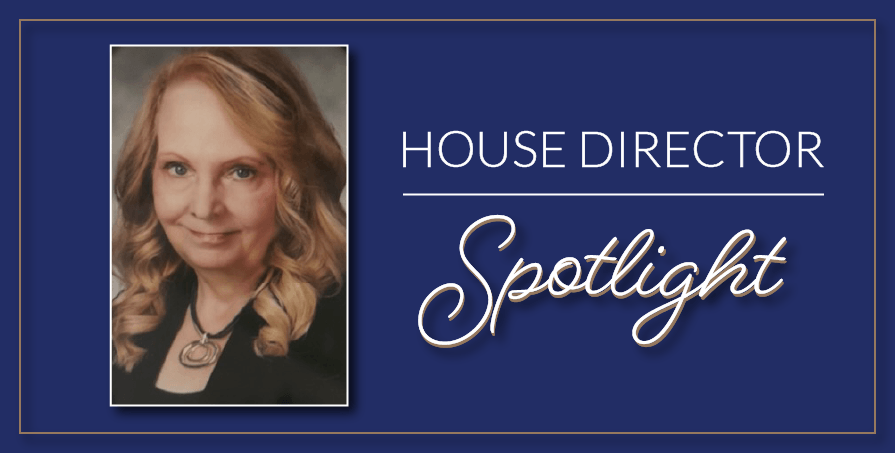Leila Nelson Gomoll, Washington, house director at the University of Washington’s Theta Alpha Chapter, says that every career she’s had from education to real estate has prepared her for this role—which she has been in for 13 years! Born and raised in Montana and having spent a part of her life in Southern California, she was happy this position was in Washington where she can now spend time with some of her favorite people, her nieces and nephews who live close by.
How did you become a house director? And why Tri Delta?
“One of my nieces, an alumna of this chapter, encouraged me to apply when there was an opening. After meeting the collegians during my interview, I was inspired by hearing them talk about their lives, their academics and their impactful work with St. Jude—it resonated with me. It made me say I want to do this and it’s the best thing I’ve ever done. My background made me the perfect candidate for this role. I have a solid understanding of what it takes to be a student and balance a full-time job, how a house is put together from a construction standpoint and what it should look and feel like when you walk into it.”
How do you find work-life balance?
“I do a lot of reading, crafting, cross stitch and going to the movie theater. I spend time with other house directors and have great relationships with them, often making time to have coffee together. I moved from Southern California to Seattle to be closer to family. I’m very active with my nephews and my 16-year-old niece and love to attend her theatre performances. Our members have seen her plays too!”
What do you love about being a house director?
“The best part is watching the women grow from young members to being ready to take on the world. I am in awe of how they balance school, work, a social life and find time to give back to St. Jude and they don’t get enough credit for that! I enjoy spending time with over 100 women each year and watching them flourish from students to professionals. I share in their excitement when they get accepted to grad school., move on in their careers and have families! It’s fun to see where everybody goes in their lives and they always end up coming back to share their life updates!”
What does a typical day look like for you?
“My day begins at 7:00 a.m., checking in with kitchen staff, walking the house, turning alarms off and catching up on emails. By 10:00 a.m. I am in the office and stay there until 6:00 p.m. I also spend time working with local house corporation board. The house, built in 1924, always seems to need something taken care of. I eat lunch and dinner with the collegians and am a fly on the wall keeping a pulse on everything. I make sure to recharge with some quiet time before dinner and walk the house before bed to make sure it’s safe and secure and all alarms are set.”
How has being a house director contributed to your growth and development personally and professionally?
“This position and Tri Delta has opened my eyes to being more inclusive from religion to culture to disabilities. It has given me the chance to meet people from diverse backgrounds and lifestyles and learn about their cultures and holiday traditions. Tri Delta does it right. Not many organizations invest in their house directors like Tri Delta with the amount of professional training we receive including mental health training. It all keeps us learning and makes our jobs easier. There is also always someone to go to for resources whether it’s another house director or Executive Office.
“After the collegians leave for the summer, I have 63 coeds between the ages of 15 and 18 years old who are vision-impaired. They live here for 7 weeks as part of a program with the State of Washington Department of Services for the Blind. This year marks Tri Delta’s 22nd year of involvement in the program. I love that Tri Delta is part of this life-changing program and that I am here to facilitate part of their experience as the house director.”
Do you have advice for anyone considering becoming a house director?
“Take time to get to know your members. There is nothing better than having someone call you by name. When I first got here, the seniors experienced a lot of transition—four different house directors in their 4 years. They are always surprised when I call them by name and that I want to know all about them! Be available so they’ll come to you when they need someone to talk to especially if they can’t talk to someone at home. Always be approachable. It’s important that they see you and feel comfortable coming to you.”

